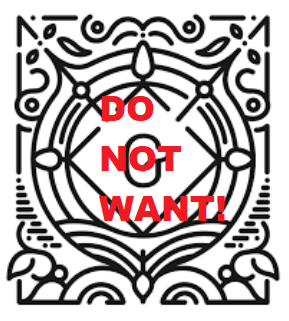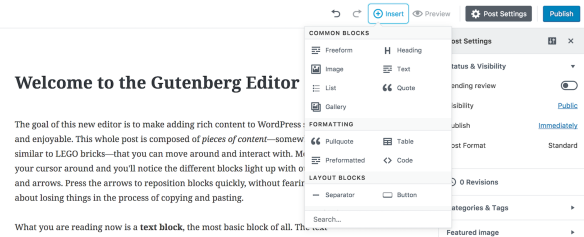
Almost every WordPress.com blogger has no doubt seen that irritating little blue blurb that keeps appearing at the bottom of the editing screen: “A new editor is coming to level up your layout,” followed by a “learn more” offer that you can click on if you really want to learn more. Over in the editor sidebar (where you find your status, post settings, categories and tags, sharing info, etc.) at the bottom is another distracting box offering you to try out the “new editor.”
Not many people like change, especially older folks like me. Those of us who write for a living or just for fun who just want a nice big easy space to write in (like we have with the Classic Editor) don’t want to have to worry about “blocks” and dragging and dropping them around to “build a page.” We just want to write, dammit.
Because essentially, what Gutenberg is, is not an editing platform intended for writers, but a page builder geared more for web designers or people more into building a page than writing text. I know this because, even though I haven’t tried Gutenberg yet myself (and hope I never will have to), I have watched many tutorials on Youtube about how it works, and have done a lot of reading and research on it, including the user reviews over at WordPress.org., where users have already been forced to adopt it — unless they install a “Classic Editor” or “Disable Gutenberg” plugin so they can continue to write their posts the old way. And, not surprisingly, the “classic editor” plugin is, at the moment, the most popular WordPress.org plugin ever, with over a million downloads already. That’s a pretty clear message for the WP staff, but they appear to not care. Like Trump, they’re just going to plow ahead and do things the way they want, and to hell with the people forced to adapt to this unwanted change.
People hate Gutenberg, at least people who want to just write, and that’s most WordPress users. Since most WordPress users, both at WP.com and WP.org, are writers and bloggers first, and were attracted to WordPress in the first place due to its user friendliness and intuitive writing platform (meaning you can easily figure it out on your own without a user manual or tutorials) that worked almost exactly like the popular Microsoft Word, which almost everyone already knew. People happily chose WordPress when they were promised, “if you know how to use Word, you will be able to use WordPress.” And it was true. The classic WordPress editor is almost ridiculously easy to use and that’s one of the reasons WordPress is still the most popular content management system (CMS) around.
Gutenberg does not give you a nice clean WYSIWYG screen that can be easily toggled to an HTML screen (if you prefer entering your own code or have custom design), with all your editing choices neatly and clearly contained in an easy to read toolbar at the top and your other options in a sidebar well away from your text. Instead, Gutenberg uses a system of “blocks,” in which every feature of your post must have its own block, even down to individual paragraphs and titles. That means you cannot see your entire page all at once, and the blocks are too small to see much of your writing at a time. Few writers can write well if they cannot see their entire post at once, because much of writing involves being able to see the whole thing in its entirety and then cut and paste and move things around, including pictures and captions. The classic editor allows us to do that easily with one or two clicks, by highlighting text or graphics and then moving it or deleting it or whatever. The classic editor is intuitive, meaning that you can learn it on your own without any special instructions.
In contrast, Gutenberg wastes your time by forcing you to work within a “block” and while these can also be moved around the page and edited, it takes more clicks and is much more complicated to do so, and involves things like hidden menus, cryptic symbols, and odd toolbars at the top of each block, and hidden icons that only appear if you hover over them within the block. Some of these icons and toolbars actually block the block itself, so you can’t even see what you have written in the block. If you are a writer who needs to be able to see the entire post to know how you want to edit it, forget it. There’s no way to see your entire post in editing format. To do that, you have to create a draft or preview (and then go back in the editor and edit the blocks, somehow remembering what you saw in the draft or preview, or keeping it in a separate tab). Also, each time you hit < enter > it creates a new block which you then must delete. There have been many other complaints about this system that I’m not even including in this post. You can read the complaints for yourself in the link I have provided below.
Most of the comments I read said Gutenberg is much slower and clunkier than Classic editor, and has turned something that’s a joy (writing a post) into a dreaded and time consuming chore. It’s complicated and nonintuitive, so it’s difficult to figure it out on your own.

Huh?
WordPress is trying (again) to fix something that isn’t broken. I understand the system is still in its “beta” version and therefore has bugs which will probably get fixed later. I also understand the company wants to remain tech savvy and up to date, and evidently, “block” editors like Gutenberg are the wave of the future. In its desperation to be “relevant,” WordPress wants to throw away something that works so they can be more like Weebly or Wix (platforms which use block editors like Gutenberg). But since most WP clients are writers, bloggers, or just regular folks trying to share their art, photography, or conduct business through their website, not web designers and page builders, WordPress is really jumping the shark by forcing its users to adapt to such a drastic change that will require them to climb a very steep learning curve and take time away from actually writing or conducting their business. I feel ultimately, WordPress users are going to go elsewhere that fits their needs better.
It feels like they are force feeding this change on us. In fact, it feels almost like a form of internet fascism, with the staff at the WordPress.org review page showing little to no empathy for its users’ complaints and concerns, even blaming them for “resisting” having to learn something new, or belittling them for not liking change. They are told to suck it up because that’s how it’s going to be, whether they like it or not. Then they are “reassured” with a formulaic sentence telling them to install the classic plugin (when it’s actually Gutenberg, which is still full of bugs because it’s still in beta format, that should be the optional plugin) if they hate Gutenberg so much. In the comments that don’t specify exactly what the person hates about Gutenberg, the staffer asks the user what the issue is. Okay, fair enough. But in the many other comments that DO specify, often in great detail, what the issues are, the staffers NEVER address the issues, only the user’s attitude and the only “help” given is to tell them to install the classic plugin.
Even if you don’t mind being condescended to and gaslighted by the WP.org staff, the plugin solution is only a temporary one.
Because the ultimate plan is to completely do away with the Classic Editor by 2022. In three years, like it or not, we will all be forced to use Gutenberg. There won’t be another option — except using a platform besides WordPress. (Already, there is something called Classic Press in the works, created by WP defectors, for people who can’t or won’t use Gutenberg — I may be looking into that myself.) I’ve seen enough of how Gutenberg works and read enough about it to know I will never have a good relationship with it. If it doesn’t work for most users at WP.org (who tend to be a bit more technically savvy than WP.com users, since their websites and blogs are self hosted), then it’s going to be an absolute nightmare for us WP.com users. Frankly, the whole idea of it terrifies me.
Here is a screenshot of the rankings of Gutenberg by WP.org users (and keep in mind that many of the five star reviews are actually bad reviews that were accidentally given five stars. I know because I’ve read many of these reviews):

In spite of the obvious bad reviews of this product, one WP staff member (I will have to paraphrase since I can no longer find the post), in their usual condescending way, scolded one user who pointed out how many one star reviews there were. The staff member actually said the review system was invalid and shouldn’t be believed. Even more unbelievably, the staff member said that most people who loved Gutenberg (obviously, almost everyone) just weren’t writing reviews or ranking the product because happy people don’t write reviews or give stars. WHAT?
WordPress.org appears to be gaslighting and shifting blame to its own users, and straight up making shit up to make themselves look superior and their own review system look invalid! That’s crazy! It makes me wonder if the people running WordPress.org are on the narcissism/Cluster B spectrum (someone else actually mentioned this to me). I can’t say if they are or not, but blaming the users of a product for disliking a change because it doesn’t work for them and is making their writing experience unpleasant seems profoundly undemocratic and callous. It seems that WordPress somehow knows it will benefit from forcing this change on people, even if most of those people wind up taking their websites somewhere else. You gotta wonder who is paying them off.
So far, these changes haven’t been forced on WordPress.com users. Yet. But it’s coming. We are reminded of it every time we open our editing screen. When it finally is, I intend to switch to the Classic Editor and keep using it as long as it’s still an option. As for 2022, I’m not going to worry about that yet. A lot can happen in three years.
Gutenberg has been compared by many to New Coke, another example of “fixing something that isn’t broken.” Hopefully WordPress realizes their mistake decides to keep Gutenberg as an optional plugin (for people who actually like playing around with confusing blocks, like page builders and web developers), and Classic Editor as its default, rather than the other way around. Gutenberg is NOT FOR WRITERS.







